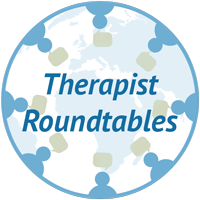Your Hosts




Where & When
A confirmation with the zoom link will be sent to registered participants the week of the event.
Live attendance required - no recording.
Wednesday, March 30, 2022 from 1:00 pm to 3:00 pm Eastern Time
Live attendance required - no recording.
Times worldwide: convert to your time zone
The TIFI Membership Committee is pleased to offer Therapist Roundtables, a Roundtable series designed especially for members who work with clients in therapeutic settings. If you are not a member, please join at this link and then return to this page to register.
Regardless of modality, we therapists hold in common the ethical and professional accountability and responsibility for our clients’ welfare and growth. It is with this understanding that we come together to explore both the challenges of our work and the opportunities that arise through bringing a Focusing orientation to our practices. These conversations are not intended to be professional supervision sessions, but rather an opportunity to share ideas and experiences with like-minded professionals.
Program Description
This Therapists’ Roundtable will draw from the chapter on “The Client-Therapist Relationship” in Gendlin’s book, Focusing-Oriented Psychotherapy: A Manual of the Experiential Method (1996), pp.283-298.
In this chapter, Gendlin offers a guiding vision for how therapists can create an effective therapeutic experience for their clients. He states that, “Interpersonal interaction is the most important therapeutic avenue. Its quality affects all the other avenues because they all happen within the interaction.” (p 282) He succinctly states his key relational framework in therapy as “putting nothing between and sitting down with the person in there.” (p. 287)
Based on this simple but profound framework, Gendlin presents a number of concrete suggestions for the kinds of explicit and implicit interactions that are helpful --and harmful --to the therapy. He offers us wise guidance on a number of issues, including creating safety for the client, engaging the “deeper continuity” in the client, addressing interpersonal difficulties between the therapist and client, transference, when the therapist should express her or his personal feelings, and more.
In preparation for this Roundtable, we ask that you thoughtfully read chapter 23, a copy of which will be sent to you after you register. You can use it to mark the sections that stand out for you. Questions you might reflect upon as you read are, “What speaks to me in this chapter?” “How does this apply to my own practice?” “What puzzles me?” How might I integrate Gene’s suggestions to make my work more effective?
At the Roundtable we will spend some time exploring our own reactions to the reading and how it relates to our work with clients. In addition, we might consider together some or all of the following questions:
- What does it look like when we really act on the understanding that “interpersonal interaction is the most important therapeutic avenue”?
- What does it mean to us to “put nothing between us and our clients and to “sitting down with the person in there”?
- How can we create a therapeutic presence that not only meets the client but opens a space for the client to experience themselves differently than before, in a way that removes stoppages and brings life forward movement?
Other issues and ideas may emerge from our mutual exploration during the Roundtable.
Through this exploration and sharing of experiences from our own professional practices, we hope that participants will glean insights and practical strategies for increasing their therapeutic efficacy.
Advance reading: Gendlin, E.T. (1996). The Client-Therapist Relationship. In Focusing-Oriented Therapy: A Manual of the Experiential Method. (pp. 282-298). New York: Guilford.
Who might be particularly interested in attending this Circle?
Therapist Roundtables are intended to serve the needs and interests of a specialized subset of our membership community who use or have used therapeutic modalities deepened by Focusing. Current and former therapists are welcome, including psychotherapists, counselors, coaches, somatic practitioners, spiritual directors, occupational or physical therapists, nurses and the like. If you have an area of interest, curiosity or passion that you would like to explore in a future Circle, please let us know.
CONNECTION>CONVERSATION>COMMUNITY
What to expect from Therapist Rountables: Each Therapist Roundtable is designed to promote informal peer-to-peer conversation. Rather than acting as expert presenters, the Hosts will serve as conversation moderators to encourage sharing and exploration of the topics from the participants’ own perspectives. All participants’ sharings are welcome and valuable, no matter what level of experience or knowledge you have on the topic. To preserve the nature of informal conversation, the program will be offered live only and no recordings will be available. Registration is limited and on a first-come, first served basis. Participants are encouraged to create follow up opportunities for connection among themselves after the Roundtable.
About your hosts:
Mary Anne Schleinich, MPS, BScOT is a counselling body psychotherapist in private practice in Calgary and online. She is certified with the Canadian Counselling and Psychotherapy Association and The International Focusing Institute as a Focusing Oriented Therapist. She teaches Focusing and has worked with pain, anxiety and trauma for 20 years.
Julie Ramsey, LICSW, FOT, is a psychotherapist in private practice in Wellesley, MA. She works with adolescents and adults in individual and couples therapy. She also teaches Focusing in small groups and enjoys bringing Focusing to all aspects of her work and life. She is a Coordinator-in-Training.
Susan Lennox, PhD, CPC, is a psychotherapist and coach in private practice in Westminster, Colorado. She is a Focusing Coordinator and has been a Certified Focusing Professional since 2000. Susan integrates Focusing and a Focusing orientation into her work with her clients.
Registration Information and Price
Registration Closes: Tuesday March 29 at 12:00 pm (noon), or when the Roundtable is full, whichever is sooner.
Zoom: This conversation will take place on an online video conference service called Zoom. Please attend by computer so that we can have your video presence as well as your audio. Calling in by phone is also possible but not preferred.
Price: The co-hosts are volunteering their time in order that this program may be brought to members of TIFI at no charge.
PLEASE NOTE: When you register, you will receive an email indicating your registration was processed. If your dues are current, we will complete your registration and email instructions to join the event within a few days of the start date. If you know your dues are not current, or if you are not yet a member, please go to the membership page to pay your dues or join and then return to this page to register. Membership page: http://focusing.org/membership
